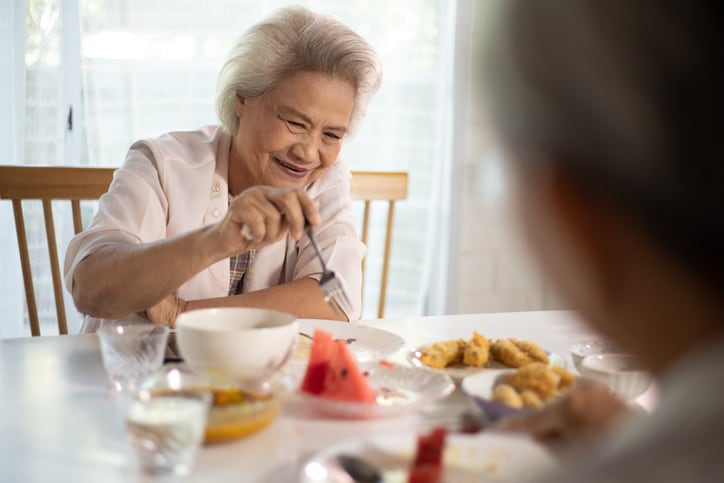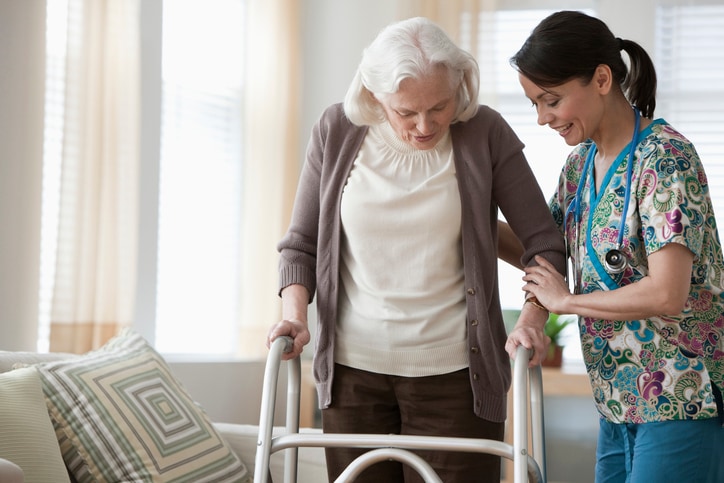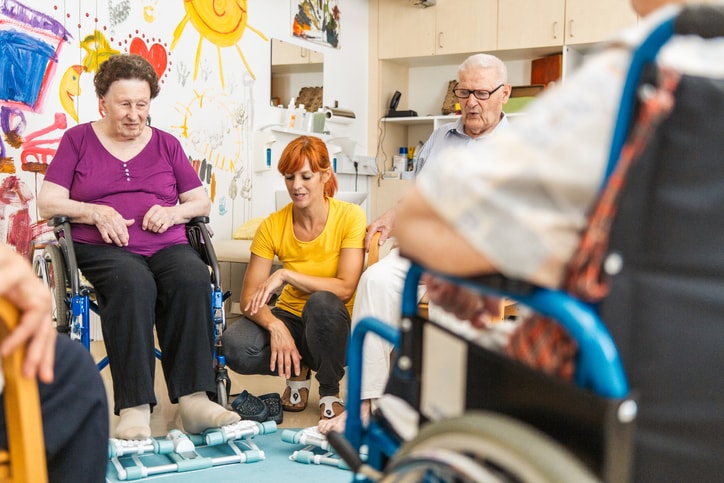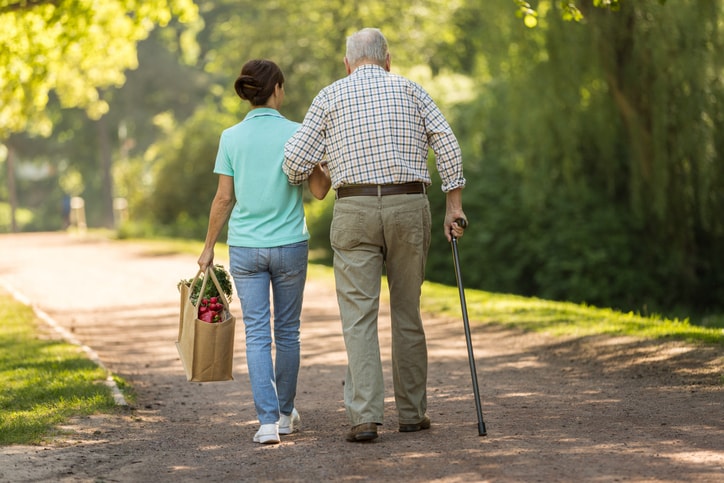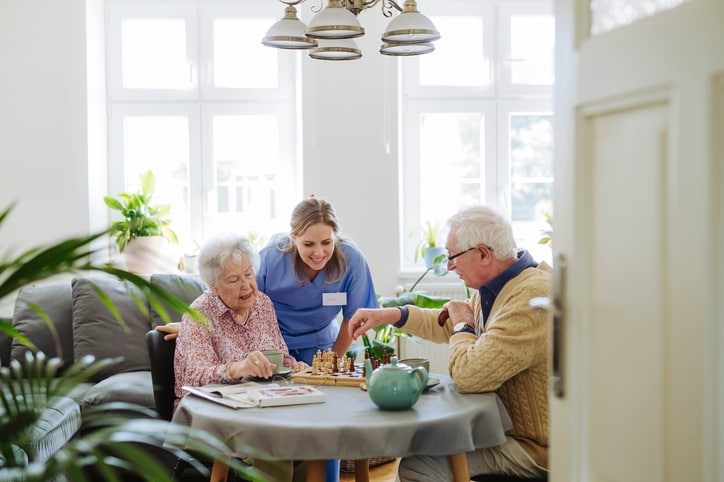Eating and mealtimes are often viewed as social events, with family members and friends gathering around a communal table and taking part in a delicious meal. But as you age, your circle can become smaller, as children create their own families or loved ones pass away. This lack of social connection, in addition to medical and physical conditions, can cause eating to become less pleasurable and ultimately lead to a loss of appetite in seniors.
“Many factors can contribute to older adults struggling with eating,” says Stephanie Fungsang, occupational therapist at McLean Hospital and Spaulding Rehabilitation Hospital. Some of these issues can include “physiological challenges, such as changes in the sensory system, oral health and body mechanics, as well as environmental and psychosocial factors,” she adds.
And because poor appetite can lead to unintentional weight loss, malnutrition and, consequently, higher rates of mortality and physical and mental decline, the experts we spoke to share why appetite can decrease in seniors, strategies for making mealtimes more pleasurable and advice on when to seek further help.
Physical causes of appetite loss
As you age, it is normal to see a slight appetite decline as your body ages and you become more sedentary, says Fotini Dimopoulos, a senior inpatient dietitian at Mount Sinai Queens in New York City. However, there are other reasons that can lead to a more drastic change in appetite, according to the experts we interviewed.
Dry mouth and dehydration
Having a dry mouth can make it uncomfortable to chew and swallow. This can be caused by certain medications, says Dr. Michele Bellantoni, medical director of Johns Hopkins Bayview Specialty Hospital Programs and associate professor of medicine in the Division of Geriatric Medicine and Gerontology at Johns Hopkins University School of Medicine. It can also be the result of dehydration. In addition to being uncomfortable on its own, dry mouth can cause dentures to be uncomfortable and rub in ways that cause sore spots, according to the National Institute of Dental and Craniofacial Research.
Eating difficulty and pain
“We often neglect going to the dentist as we move into advanced aging,” says Sondra “Sam” Cradduck, gerontologist, psychologist and owner of The Living Room. “A toothache, poor fitting dentures, gum disease and other dental issues can make” eating painful.
Fungsang adds that “Decreased mouth and lip control, coordination, development of tremors or overall weakness can make the physical act of eating food difficult.”
Loss of smell
Your senses are very important when it comes to enjoying your food. In fact, losing or having a reduced sense of smell has been documented as causing less pleasure when eating. And with more than 60% of “our aging population losing their sense of smell, food just doesn’t taste the same,” says Cradduck.
A change in lifestyle
In addition to bodily functions changing, Bellantoni and Cradduck point to lifestyle changes when it comes to a difference in appetite. Part of it is routine, says Bellantoni: If you were employed in the workforce, you would have your breakfast before you leave for work and then sit down and eat lunch during your break. You’d come home and have a snack while making dinner. But once retirement hits, that schedule goes out the door.
Cradduck adds that a sedentary lifestyle may result in you not working up an appetite, as well.
Emotional causes of appetite loss
Beyond the physical reasons, how you’re feeling mentally can also affect your desire to eat.
Depression
“Loneliness and depression are huge when it comes to not wanting to eat,” says Cradduck. And while depression in seniors can be attributed or related to a number of factors, including social isolation and loneliness, depression and appetite loss can also go hand-in-hand.
Lack of social connection
When you’ve been used to eating with your family or partner for years, it can be jarring to have to acclimate to eating alone. “The thought of fixing a meal for just yourself can be very depressing,” says Cradduck. And even with elderly couples, mealtimes may lack luster and feel like something “you have to do, and not something that you get to look forward to,” she adds.
Diet overwhelm
As you age, you are at a greater risk for comorbidities, such as diabetes, renal failure and kidney disease, says Dimopoulos. And this means when you go to the doctor, you’re inundated with (sometimes conflicting) diet information, she adds. “Don’t have fruit because [it’s] high in sugar. Eat fruit because [it’s] high in potassium.” It can take the joy out of eating, when the focus is solely on the nutritional aspects.
Risks associated with loss of appetite in seniors
While a temporary change in appetite may not give you pause, the experts we spoke to warned of two main concerns when it comes to loss of appetite in older people: malnutrition and increased mortality.
One of the key risks of prolonged appetite loss is malnutrition, says Dimopoulos. And a physical sign that you might recognize is rapid muscle depletion, particularly in the temporal regions of the face and the clavicle region, she adds.
Malnutrition can result from more than simply appetite loss, such as acute and chronic disorders. However, the end result is the same: malnutrition in older adults is associated with increased mortality, morbidity and physical decline, “which has wide ranging acute implications for activities of daily living and quality of life in general,” according to a study published in “Nutrients.”
Strategies for addressing a lack of appetite in elderly people
If you or your loved one is experiencing poor appetite, and you’ve ruled out reasons such as physical discomfort or medication issues, here are some ways you can eliminate additional barriers to eating.
Make meals social
The experts we spoke to agree that a major reason older adults find less joy in eating is the lack of social connection. With that in mind, Cradduck suggests finding ways to make mealtimes an opportunity for connection, whether that’s by family members sharing a meal with their senior loved one on a rotating basis or hiring a companion caregiver to help them prepare a meal and keep them company. For some older adults, it might also be a good time to consider a senior living option that offers regular meals in a communal dining room atmosphere.
Make meals enjoyable
While there are times you have to strictly adhere to a diet, Dimopoulos advises weighing the pros and cons of being too restrictive. For example, if your loved one has diabetes and is struggling to eat because they’re being told they can’t have potatoes or fruit and that’s what they’re craving, she suggests that it’s better to let them indulge in an apple.
Cradduck adds that it’s important to remember that seniors are adults and get to decide what they want to eat. “If an 85-year-old wants a banana split for dinner, it should be OK,” she says. “We all make choices that don’t line up with what would be ‘best’ or ‘healthiest.’”
Make meals sensory
“Senses can decline with age, making eating less enjoyable,” says Fungsang. She advises creating a sensory experience surrounding mealtimes, “considering more than just taste — sight, smell and sound all play a role in a pleasing, inviting meal and support both physical and psychological motivations to eat.”
- Light: Is there enough lighting to see your food and drink clearly?
- Smell: Are there pleasing fragrances, such as brewing coffee or toasting bread?
- Sound: Consider gentle background music, like a dinner party (or your favorite artist).
- Touch: Are you comfortable and able to reach everything you need to eat independently?
Make meals easier
Navigating what you’re going to eat for each mealtime can be exhausting, mentally and physically. In addition to government nutrition programs, there are also meal and food delivery services that can help take some of the labor out of meals, such as Blue Apron, Uber Eats and HelloFresh, says Cradduck.
Fungsang adds that finger foods or pre-cut, cooked foods can make meals easier. A nearby family member or a paid caregiver can help weekly with this option.
Make meals calorically dense
Because eating a whole plate of food might be overwhelming, Dimopoulos suggests smaller and higher caloric snacks or meals. She recommends things like nuts, avocados and protein shakes. She adds that health shakes can also be accessible to older adults who have missing teeth or experience pain when chewing.
Make snacks and meals more frequent
Your metabolism declines rapidly as you age, says Dimopoulos. To help slow this process and keep it functioning, she recommends eating every 2 to 3 hours, even if it’s a small snack.
When to seek professional help
While some older adults may have planned their weight loss because of obesity, diabetes, cardiovascular health or other health reasons, Bellantoni says you should be concerned when there’s unexplained weight loss. “When there’s unplanned weight loss, we have to find the reason because that is a predictor of frailty and death,” she says.
Cradduck adds that it’s important to “talk to the doctor if you see a significant weight loss or change in condition. There are medications that can stimulate appetite and help if that is needed.”
And if the situation is less dire, but navigating a loss of appetite in your senior loved one is causing distress, Dimopoulos recommends reaching out to a registered dietitian through the Academy of Nutrition and Dietetics. Most health plans also offer diet and nutrition resources.
A final word on loss of appetite in older people
While a decline in appetite may seem like a natural part of aging, it’s important to recognize when it signals a larger issue. Addressing these challenges early can help prevent serious health risks, like malnutrition and physical decline.
“You know your family member,” says Fungsang. “Trust your instincts if something doesn’t seem right,” she advises. “Talk to your loved one in a nonjudgmental way, to see if you can understand [their] barriers to eating; it may be something you can solve together.”
By taking proactive steps, such as making meals more social and improving the ambiance surrounding mealtimes, you can help ensure that your loved one gets the nutrition and enjoyment out of food that they need to stay mentally and physically healthy.
